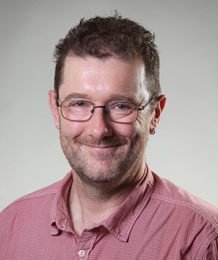
Professor David Richards.
Exeter professor's double accolade for nursing science
A University of Exeter professor has been elected President of the European Academy of Nursing Science.
Professor David Richards, who is based in the University’s Mood Disorders Centre, is also one of only two nurses to become a National Institute for Health Research (NIHR) senior investigator.
The European Academy of Nursing Science is an independently organised body composed of individual members who have made significant contributions to the advancement of nursing science in Europe. Professor David Richards replaces Professor Ingalill Rahm Hallberg as President and will hold the position for the next three years. The Academy links individual nurse scientists from across Europe and provides a forum for nurse scientists to meet, work together and develop the evidence base for nursing.
Professor David Richards said: “The European Academy of Nursing Science is the place in Europe where academic nurses look first for inspiration, advanced education and scientific leadership. For example, just three weeks ago in Leuven, Belgium, the Academy hosted a two-week summer school and conference where 200 doctoral, post-doctoral and experienced researchers in nursing came together to explore how the research base for effective nursing interventions can be developed tested and implemented throughout Europe. The Academy’s inspirational work is recognised by the European Science Foundation who provide significant funding for these and other Academy activities.”
David Richards is one of an elite group of 200 health services researchers nationally who are National Institute for Health Research (NIHR) senior investigators. Professor Paul Dieppe of the Medical School is also an NIHR senior investigator.
David is Professor of Mental Health Services Research at the University of Exeter’s Mood Disorders Centre. He is at the forefront of national and international efforts to improve access to treatment for those suffering from high prevalence mental health problems such as depression. He led the development of the low-intensity treatment methods at the heart of the UK Department of Health‘s ‘Improving Access to Psychological Therapies‘ (IAPT) programme from its inception in 2005 and was Clinical Informatics Advisor to the national IAPT programme from 2008-2011.
Date: 9 August 2012
